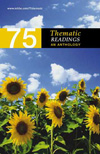
E.B. White |  |
E.B. WhiteE.B. White, "The Meaning of Democracy" E. B. White (1899-1985) was born in Mount Vernon, New York and received
an A.B. from Cornell University. He was a poet as well as a novelist and
essayist, known for his witty, elegant style in all three modes of writing.
White was an editor at The New Yorker for decades, as well as writing
"The Talk of the Town" column there. White was responsible for
the 1972 and later editions of The Elements of Style, building
upon William Strunk's foundation,and he also wrote two classic
novels: Stuart Little (1945) and Charlotte's Web (1952).
His work has been collected in several volumes including Here is New
York (1949) and The Essays of E. B. White (1977). Among many
other awards during his lifetime, White was awarded the Presidential Medal
of Freedom—the highest civilian honor in the U.S.—for his work. "The
Meaning of Democracy" was first published in 1944 in The New Yorker
and collected in The Wild Flag (1946). | QUESTIONS FOR DISCUSSION | CONTENT - What prompts White to write this brief essay?
- What does the author mean by the phrases stuffed shirt and
high hat?
- How does White compare duty and pleasure?
- Explain this reference: "Democracy is the score at the beginning
of the ninth."
- How does the author link voting booths to libraries?
STRATEGY AND STYLE - What types of support does White provide while constructing his
definition of democracy?
- What two-word phrase is repeated over and over in the second paragraph?
How does this repetition reflect the author's feelings about democracy?
- Again in paragraph two, the author starts by claiming that the
War Board knows what democracy is, but proceeds with his definition
anyway. How does the use of this rhetorical device suggest the author's
state of mind concerning his audience?
- Compare the first sentence of this piece with the last. What has
White done to the first to construct last? How effective do you find
this relation between introduction and conclusion to be?
| ENGAGING THE TEXT | - Describe your mood while reading this essay. Were you amused, bemused,
charmed, shocked, neutral? Were you thinking of your biology quiz? Were
you glad it was so short? Were you thinking it would be a good idea
to read more of White's work, maybe?
- Describe your relationship with politics. How might your feelings
in that regard have influenced your reading of "The Meaning of
Democracy"?
| SUGGESTIONS FOR SUSTAINED WRITING | - Write your own definition essay about democracy. Following White's
lead, incorporate creative comparisons into your work. How do your comparisons
and White's differ? What are the major reasons for this difference?
- How have ideas of democracy in America changed since White wrote
this short essay? Some things you might want to consider: What view
of war does this essay present? Of the mass media's relationship to
war? Of voting? Of baseball, even?
| FOR FURTHER RESEARCH | Do some research about the Writers' War Board. When was it formed? What
was its mission? What official governmental status did it have? Who made
up its membership? What did it do? How effectively did the War Board operate?
How did your research deepen your understanding of your reading? | WEB CONNECTION | This is the homepage of the New
Yorker, a magazine with which White had a close relationship for many
years. Do you read it? What magazines do you read? | LINKS | Biographical This NYT
page has a couple of quotes, a photo of White, and some links to
articles and reviews. As a bonus there's a link to a rare recording
of White himself reading from Charlotte's Web and The Trumpet
of the Swan. This is a very good place to start your online research
of White. (Free registration required.) Interested in White's personal history? Here is a biography
of the author that also has a few embedded links. Did you know that White has contributed to several films? Want to know
more? Here is an E.B.
White filmography.
Bibliographical Here are some quotations
and a White bibliography. Did you find anything there that could help
you in your own writing? Can you trust the accuracy of this source?
How can you tell? Click here to
hear White reading an excerpt from Charlotte's Web. If possible,
read along. What did you find interesting in his reading? Here's an excerpt
from Stuart Little. Have you seen the movie? Come on, admit
it. It was kind of cute.
Cultural Here is an online early
version of The Elements of Style, the one by Strunk. White
later revised it and today we have what a lot of people call simply
"Strunk and White." It's an essential book for all writers.
Here is the citation
for White's Pulitzer Prize, which honored his entire body of work. Are
any of the other writers on that page familiar? Where would you find
out information about them? This is a page
about Brooklin, Maine, site of White's farm. How does having a bit
of information like this help you understand an author's work?
|
|
|
|